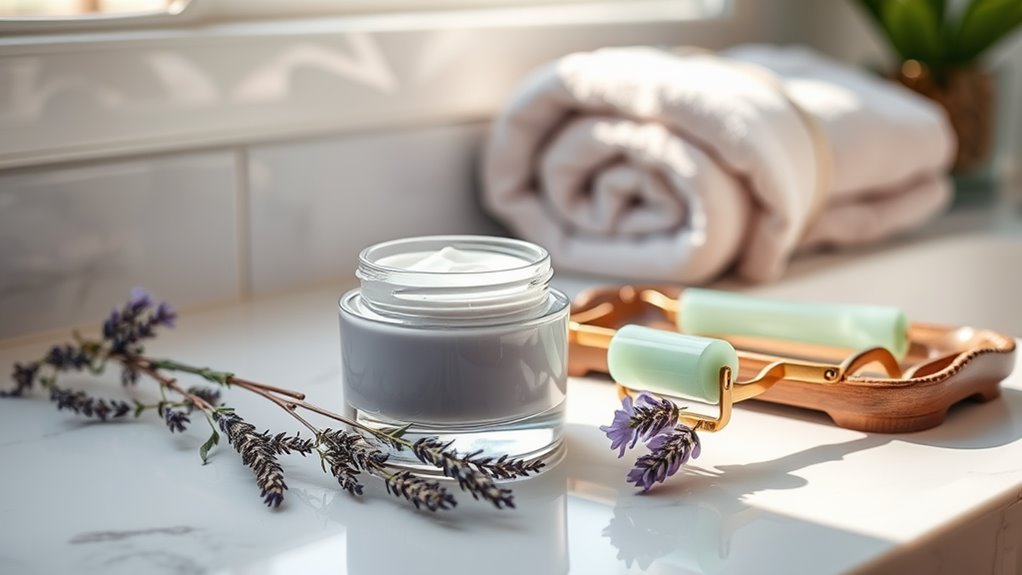Your Skincare Routine Might Be Missing This Critical Step
You might be missing a critical step in your skincare routine: exfoliation. Regularly removing dead skin cells boosts cell turnover and enhances the absorption of your serums and moisturizers. Exfoliating once or twice a week can brighten your complexion and keep your skin looking fresh. Don’t forget the importance of incorporating serums, using sunscreen daily, and staying hydrated, too. Want to uncover more about these essential elements for healthier skin?
Understanding the Importance of Exfoliation
Exfoliation plays a crucial role in your skincare routine, as it helps remove dead skin cells, revealing a brighter, smoother complexion. It’s one of those skincare routine essentials that too many folks overlook, but trust me, it’s vital for maintaining healthy skin.
When you exfoliate, you’re stimulating cell turnover and promoting a fresh layer of skin, which helps your other products absorb better. However, be mindful of the warning signs of excessive exfoliation, as overdoing it can damage your skin barrier.
Integrating exfoliation into your routine doesn’t have to be complicated. Choose a gentle scrub or chemical exfoliant that suits your skin type, and start slowly—once or twice a week should do the trick.
Join the community of beauty lovers who swear by it, and you’ll likely notice your skin feeling softer and looking more radiant in no time. The transformation doesn’t just enhance your appearance; it boosts your confidence too.
The Role of Serums in Your Skincare Routine
After you’ve exfoliated and prepared your skin, serums play a significant role in elevating your routine. These lightweight, nutrient-packed formulations deliver targeted treatments like hydration, brightening, or anti-aging effects directly to your skin.
You mightn’t realize it yet, but incorporating a serum can bridge the gap between your cleanser and moisturizer, making your skincare feel more complete.
Choose a serum that aligns with your specific skin goals. For instance, if you’re fighting dullness, look for one rich in vitamin C. Applying it right after exfoliation helps your skin absorb all those powerful ingredients effectively. Additionally, identifying your skin type can help you select the most suitable serum for your needs.
Plus, the ritual of serums can feel incredibly luxurious, allowing you to carve out a moment for self-care.
Why Sunscreen Is Non-Negotiable
While you may think your skincare routine is complete after applying serums and moisturizers, not using sunscreen can undermine all your efforts. Sunscreen isn’t just an add-on; it’s a crucial defense that keeps your skin healthy and youthful.
UV rays can lead to premature aging, dark spots, and even skin cancer. By skipping this step, you risk losing the benefits of all those products you’ve invested in. It’s essential to apply enough sunscreen to ensure adequate protection, as many people tend to use insufficient application when they think they’ve applied enough.
It’s especially important to find a sunscreen that fits your lifestyle—whether it’s a lightweight SPF moisturizer or a spray you can layer throughout the day.
Your skin’s health impacts your confidence, and everyone wants to belong to a community that values self-care. By prioritizing sunscreen, you’re not just protecting yourself; you’re embracing a proactive approach that others will admire.
The Benefits of Hydration for Skin Health
Since hydration is essential for healthy skin, you might be surprised at how much this simple practice can transform your complexion. When you drink enough water and use hydrating products, your skin appears plumper and more radiant. It helps maintain your skin’s natural elasticity, reducing the appearance of fine lines and wrinkles.
Additionally, staying hydrated supports your skin barrier, protecting it from environmental stressors. You’ll likely notice improved texture, making your skincare products work more effectively.
Plus, when you’re well-hydrated, your skin can better fight off dryness and irritation, creating a smoother surface for makeup application. Research indicates that incorporating hydration into your routine isn’t just about drinking water; consider adding serums or moisturizers with hyaluronic acid for an extra boost.
Recognizing the Signs of Skin Sensitivity
Understanding your skin’s unique signals is crucial, especially if you’re prone to sensitivity. You might notice redness, itching, or a burning sensation after using certain products. If your skin feels tight or becomes flaky, it’s your body’s way of saying it needs a gentler approach. Pay attention to these signs; they can help you foster a more comfortable and confident skincare journey.
You’re not alone in this experience. Many are navigating the same concerns, seeking the right balance for their skin. Environmental factors—like changing weather or pollution—can also trigger sensitivity, making it important to stay aware of your surroundings. Incorporating evidence-based ingredients can help calm irritation and support your skin’s barrier function.
Listen to your skin and consider keeping a skincare journal to identify patterns or reactions. This way, you’ll build a routine that truly respects your skin’s needs while feeling supported in your skincare goals. Remember, your skin is unique, and learning to recognize its signs is the first step towards harmony.
Tailoring Your Routine to Your Skin Type
Your skincare routine should reflect your unique skin type to ensure it thrives. Understanding your skin’s needs is crucial for achieving that glowing complexion you’ve always wanted.
Tailoring your routine not only boosts your skin’s health but also helps you feel connected to your self-care journey.
-
Oily Skin: Use lightweight, oil-free products to control shine while keeping pores clear.
-
Dry Skin: Opt for rich, hydrating formulas that provide moisture and nourishment.
-
Combination Skin: Balance is key; use a mix of products that cater to both oily and dry zones.
-
Sensitive Skin: Choose fragrance-free, gentle formulations that soothe and protect your skin barrier.
Additionally, you can discover your skin type at home using a simple test to better inform your product choices.

